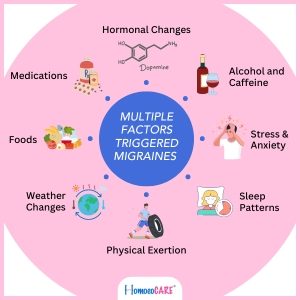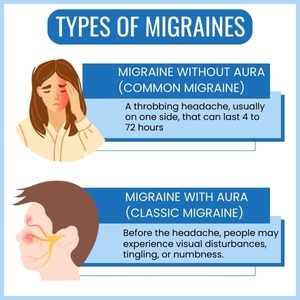Migraine is a severe, throbbing headache often occurring without a clear cause. It is primarily vascular, meaning changes in the blood vessels in the brain trigger the condition. These changes, affecting blood flow and nerve function, can vary from person to person, and migraines are among the most common headache disorders, affecting 10-15% of the global population.
Typically, migraines begin in childhood or adolescence and are most common among young and middle-aged adults.
The exact cause of migraines remains unclear, but they are believed to result from abnormal brain activity affecting vascular and neurological systems. Factors influencing migraines include:

Migraines are often triggered by multiple factors, which vary per individual:

Migraine Without Aura (Common Migraine): Characterized by a throbbing headache, usually on one side of the head, lasting 4-72 hours, and often accompanied by nausea, and sensitivity to light and sound.
Migraine With Aura (Classic Migraine): Preceded by visual disturbances, tingling, or numbness (known as an aura), warning of the impending migraine attack.
A headache is typically diagnosed as a migraine if it:
Migraine treatments generally involve OTC pain relievers. However, overuse of painkillers can lead to rebound headaches. Triptans and anti-nausea medications are prescribed in some cases but often have temporary effects and potential side effects.

Homeopathy offers several remedies to address the underlying causes of migraines and provide lasting relief without side effects. Below are the top 7 homeopathic medicines commonly used for migraine treatment:
At HomoeoCARE, we take a detailed history of your symptoms, triggers, and sensitivities to personalize your treatment plan. By understanding your unique migraine pattern, our homeopathic remedies aim to restore balance in blood flow and nerve function, addressing the root cause of your migraines. Unlike conventional treatments, homeopathic remedies do not have side effects and offer a permanent cure.
A 17-year-old girl, S.P., suffering from severe headaches accompanied by nausea and vomiting for over a year, came to HomoeoCARE. After 6 months of homeopathic treatment, she was completely free of migraine symptoms, with no recurrence since.
If you are struggling with frequent migraines, consider consulting a homeopathic doctor for a holistic and permanent solution.



Homeopathy can effectively address migraines by identifying and treating their underlying causes. Many patients experience a significant reduction in frequency and intensity, with some achieving complete recovery.
HomoeoCARE has gained a reputation as the best homeopathic clinic in Mumbai for delivering amazing results where conventional medicine has fallen short. Don’t just take our word for it; visit our cases section to witness the power of homeopathy for yourself. See firsthand how HomoeoCARE has transformed the lives of countless individuals and families through its innovative approach to healthcare.